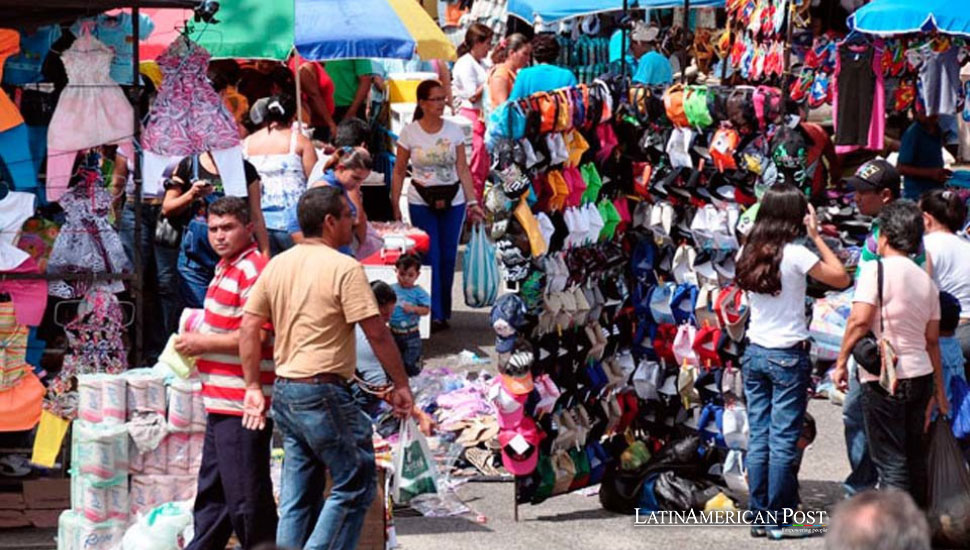Venezuela’s Untaxable Economy: How Leftist Dictatorships Fuel Informality

Leftist regimes across Latin America often enact policies to formalize their economies, yet these policies create the informal sectors they seek to control. The unintended consequences of taxation and regulation drive millions into untaxable and unregulated economic activities, undermining efforts to tax what they helped create.
Leftist Dictatorships and the Birth of the Informal Economy
Across Latin America, leftist governments, with Venezuela being a prime example, have pursued aggressive policies to regulate and tax businesses, often with disastrous unintended consequences. The notion that more taxes and tighter control over economic activities would somehow strengthen the economy and improve the livelihoods of millions is based on a flawed understanding of informal economies. Instead of uplifting people into the formal sector, the excessive taxation and heavy-handed regulations have pushed millions into informal work, making them part of an untaxable, unregulated economy that operates outside the reach of the state.
In countries where leftist dictatorships have clung to power, their economic mismanagement has hollowed out industries, stifled private investment, and left millions struggling to survive. This creates the ideal conditions for an informal economy to flourish. From street vendors to freelance laborers, millions find refuge in informal jobs, evading the state’s crippling regulations and tax burdens. These economies are resilient, adaptable, and untouchable by the same authorities trying to bring them under control.
Rather than recognizing this reality, leftist regimes like those in Venezuela, Cuba, and Nicaragua attempt to tax and regulate their way out of crises. These policies often target the very sectors that provide a lifeline to those living in extreme poverty or under authoritarian oppression. However, formalizing the informal economy—especially in a context of political repression and economic decay—is virtually impossible. Worse yet, these governments’ policies often create and sustain the informal economies they seek to control.
An Over-Taxed, Under-Managed Reality
Venezuela provides a stark example of how misguided leftist policies drive informal economies. The country’s National Council of Commerce and Services (Consecomercio) recently urged the government to reform its tax policies to tackle rampant informality. Gustavo Valecillos, president of Consecomercio, emphasized the need for a “deep and comprehensive” tax reform to stimulate economic activity while addressing the massive informal sector. Valecillos’ plea reflects a deeper reality: the informal sector in Venezuela is not a symptom of financial health but of widespread dysfunction.
The rise of informal economies in Venezuela is not simply a byproduct of external factors such as sanctions or global economic downturns; it is primarily driven by the oppressive economic environment created by Nicolás Maduro’s regime. Years of hyperinflation, currency devaluation, and state overreach have made it nearly impossible for businesses to operate within the formal economy. Private enterprises face sky-high taxes, constant bureaucratic interference, and an unstable legal framework, making long-term planning a gamble.
As a result, more and more Venezuelans are turning to the informal sector. Mechanics work outside licensed garages, street vendors sell goods without permits, and even larger-scale operations avoid formal registration to escape taxation. The National Chamber of Mechanical Workshops (Canatame) vice president Angelo Sangregorio noted the importance of certifying mechanics and workshops as part of a more significant effort to combat informality. Yet without broader reforms to reduce the tax burden and ease regulatory pressures, such measures are unlikely to succeed. Informality has become the only viable option for many in Venezuela, where paying over 80% of a company’s tax revenue leaves little room for investment, wages, or innovation.
Learning from Latin America’s Informality Problem
Venezuela is far from the only example in Latin America where leftist regimes have inadvertently fueled informal economies. Across the region, similar dynamics are playing out, particularly in countries like Argentina, Bolivia, and Nicaragua. In Argentina, for example, the informal economy accounts for nearly half of all jobs. Successive populist governments have imposed burdensome taxes and regulations on businesses, believing that the state could fix economic imbalances through centralized control. Yet, these policies have backfired, pushing businesses into the shadows where they cannot be taxed or regulated.
Bolivia, under former President Evo Morales, faced similar challenges. While Morales’ government enjoyed economic success for a period thanks to high commodity prices, the informal economy ballooned as the state increased its control over key sectors. Tax policies aimed at wealth redistribution, yet they drove small businesses and individual workers to operate informally, which the state could not reach. While Bolivia remains a top exporter of natural gas, its informal economy remains vast, feeding off the inefficiencies created by state interference.
Nicaragua, under Daniel Ortega, has also seen a rise in informality. The state’s authoritarian grip and a failing economy have led to massive discontent among business owners who find it easier to evade taxes and regulations than comply. These examples highlight a broader truth: informal economies will persist and grow if leftist regimes prioritize state control over economic freedom.
In each of these cases, the informal sector provides a survival mechanism for citizens unable to cope with the oppressive tax and regulatory environment. Leftist regimes, instead of acknowledging the problem, double down on the very policies that create informality, resulting in a vicious cycle where the state attempts to tax the untaxable.
A Vicious Economic Cycle
The concept of taxing the untaxable speaks to the inherent contradiction within leftist economic policies in Latin America. Governments entrench informality by attempting to formalize informal economies through taxation and regulation. The logic is simple: when people and businesses cannot comply with the state’s tax demands, they operate outside the formal economy. In this space, they are untaxable—beyond the reach of government policy and immune to the rules of formal commerce.
Yet, the solution put forward by many leftist regimes is to double down on taxation, creating more barriers to formalization. In Venezuela, for example, businesses must navigate a complex and ever-changing tax regime. Consecomercio’s call for reform acknowledges that the current system is failing. Still, the broader reality is that no amount of tax reform can address the underlying economic dysfunction driving people into the informal sector.
Similar dynamics are in Cuba, where private businesses operate in a legal gray zone. While the Cuban government has allowed limited economic freedoms in recent years, it continues to impose strict controls on business activities, leading to widespread informality. Like in Venezuela, Cuban entrepreneurs find it easier to operate in the shadows, free from the state’s excessive demands. The result is a thriving informal economy that undermines the state’s ability to generate revenue through taxation.
The irony is that leftist regimes claim to champion the working class, yet their policies disproportionately harm those they purport to help. In an attempt to tax the untaxable, these governments are driving more and more people into informal work, where they lack social protections, access to credit, and the ability to grow their businesses. The informal economy becomes a space of necessity, not opportunity, where workers and companies struggle to survive in a system actively working against them.
The broader lesson for Latin America is clear: informal economies will continue to grow until governments prioritize economic freedom over state control. Taxation and regulation alone cannot bring people into the formal sector. Only by reducing the burdens placed on businesses and workers can governments hope to create an environment where formalization becomes an attractive option. Leftist regimes that ignore this reality will continue to chase after the untaxable, creating an ever-widening divide between the formal and informal sectors of their economies.
Also read: Venezuela Suspends Flights Amid Election Dispute: Impacts on Diplomacy
Not merely economic circumstances drive informality across Latin America, but the policies of leftist regimes that seek to tax the untaxable economies they have created. The untouchable informal sector will remain resilient if the burdens of taxes and regulations remain unbearable. Other Latin American countries should heed the lessons from Venezuela and beyond. Informality is not a problem that can be taxed out of existence—it is a symptom of an overbearing state that needs to rethink its approach to economic management.




